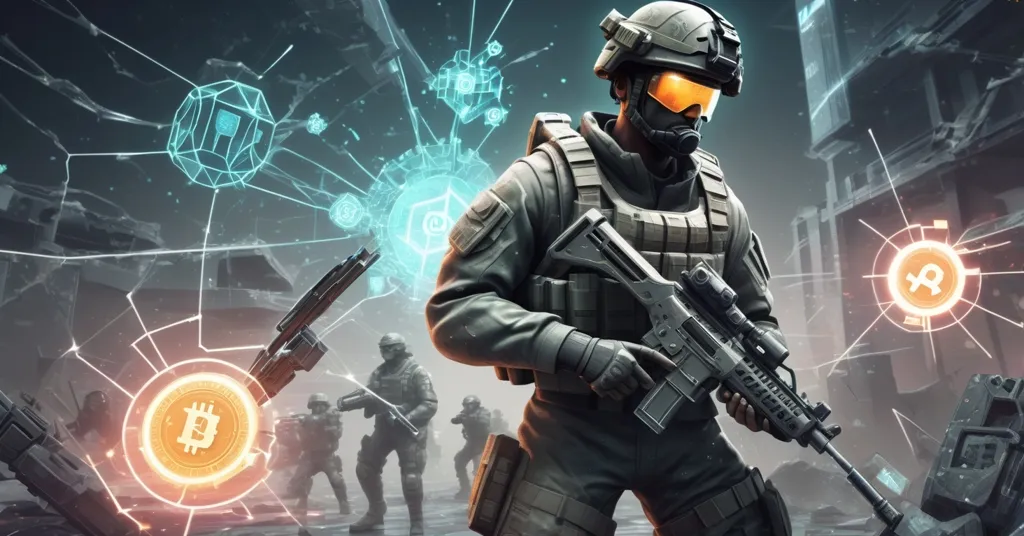Can Blockchain Save Call of Duty? Exploring Crypto’s Role in Reviving a Fallen Gaming Giant

Can Blockchain Gaming Revive Call of Duty? A Franchise’s Collapse and Crypto’s Disruptive Potential
The gaming giant Call of Duty (COD), once the undisputed king of first-person shooters, is grappling with a historic decline in player numbers just as Black Ops 7 looms on the horizon with a reveal set for August 19, 2025, at Gamescom’s Opening Night Live. Amidst this freefall, a tantalizing question emerges: could blockchain technology and its impact on player engagement offer a lifeline to a franchise drowning in player discontent? Let’s unpack the collapse of COD and explore how decentralized innovation might reshape gaming’s future.
- Player Exodus: SteamCharts reports COD active users at a low of 27,900 on July 17, 2025, an 86% plunge from a peak of 488,897.
- Community Backlash: Gamers rage over broken anti-cheat tools, clunky gameplay, and uninspired updates.
- Crypto’s Promise: Blockchain gaming, NFTs, and play-to-earn systems could rebuild trust and engagement—if core issues are fixed first.
COD’s Downward Spiral: A Centralized Disaster
For years, Call of Duty defined multiplayer gaming, pulling in millions with its fast-paced combat and cultural cachet across titles like Modern Warfare and Black Ops. Activision, the franchise’s original publisher, once claimed players racked up over 25 billion hours of gameplay by 2020—equivalent to 2.85 million years of human time. But gamers aren’t buying it. On platforms like Reddit, skepticism runs deep, with one user questioning the data’s origins:
“How would they have gotten that number if the Xbox isn’t connected to the Internet?”
Another user dug into historical claims, pointing out recycled stats from nearly a decade ago:
“I actually did a little bit more digging and found an even older article from 9 years ago claiming the same figures for hours. But again, all of these numbers are still questionable without any proper evidence. These numbers could have very well been pulled out of their ass.”
Verified numbers tell a bleaker story. SteamCharts data on COD player decline shows active players on Steam plummeted to just 27,900 on July 17, 2025, with a 24-hour peak of 66,798—a gut-wrenching 86% drop from an all-time high of 488,897. Even the release of Black Ops 6 in November 2024, hyped as a revival with its integration into Xbox Game Pass, couldn’t reverse the trend. Player counts spiked briefly to 33.7 million from 20.7 million in 2023, only to crash to 20.6 million by March 2025, lower than the 20.8 million recorded a year prior. Daily fluctuations between July 10 and 17, 2025, hover between 25,000 and 66,000 at peak times—hardly the numbers of a thriving title.
Microsoft’s acquisition of Activision Blizzard, finalized in October 2023, was supposed to be a game-changer. Instead, it’s become a lightning rod for criticism. Black Ops 6’s launch on Game Pass aimed to swell subscription numbers, yet analytics from Ampere reveal a pitiful 2% uptick. Social media, especially X, is a cesspool of raw frustration. One gamer didn’t mince words:
“This game is so dogshit. Movement is bad. Audio is bad. Meta is bad. Anticheat is bad. Bundles are bad. Lmaoooo.”
Another, reflecting on COD’s fall since Modern Warfare 2019, vented their disillusionment:
“Can’t wait to NOT play this! Seriously if you showed this screenshot to me back on mw2019 (not that long ago) I would’ve thought you were on crack. But still every cod influencer is going to buy it up and keep degrading the standard.”
The complaints are a laundry list of failures: ineffective anti-cheat systems letting hackers run wild (think tools meant to stop unfair play that just don’t work), sluggish movement mechanics making gameplay feel off, unbalanced “meta” (the dominant strategies or weapons that skew competition), and updates that seem more like cash grabs than meaningful content. Even gimmicky promos like the Season 4 Beavis and Butthead crossover landed with a thud. While the free-to-play battle royale spinoff, Call of Duty: Warzone, holds stronger with 1 to 3 million daily active users and 30 to 50 million monthly players per Activeplayer estimates, it’s a lone bright spot in a darkening landscape.
Gaming’s Broader Crisis: Trust and Greed in a Centralized World
COD’s woes aren’t isolated—they reflect a gaming industry buckling under its own weight. Predatory monetization through microtransactions—think paying real money for virtual skins or weapons—has turned players into walking ATMs for publishers. Hackers exploit weak systems, ruining fair play, while transparency about stats or development roadmaps is practically nonexistent. It’s a mirror to the centralized financial systems Bitcoin was born to disrupt, where opaque middlemen prioritize profit over people. Microsoft’s moves post-acquisition, like pushing COD into cloud gaming via Xbox Cloud Gaming and NVIDIA GeForce NOW, or adding accessibility features like asymmetrical hearing compensation in Black Ops 6, aim to broaden reach but miss the mark on core gamer demands for quality and trust. Meanwhile, competitors like Fortnite and Apex Legends siphon players with fresher, often free-to-play experiences, exposing COD’s post-acquisition struggles under Microsoft’s oversight.
Blockchain Gaming: A Decentralized Fix for a Broken Industry?
Here’s where the conversation gets juicy. Blockchain technology—the secure, transparent digital ledger that powers Bitcoin—offers a radical alternative to gaming’s centralized mess. At its core, blockchain is a tamper-proof record spread across a network of computers, ensuring no single entity controls the data. Applied to gaming, it could tackle COD’s trust issues head-on. Imagine a decentralized anti-cheat system where every player action is logged on a blockchain, making hacks traceable and bans undeniable. No more relying on Activision’s half-baked tools; the community could audit fairness in real time.
Then there’s player ownership through NFTs, or non-fungible tokens—unique digital assets verified on a blockchain, like a deed to a virtual collectible. In COD, rare skins or weapons could be NFTs, owned and traded by players on open marketplaces, cutting out publisher middlemen who currently pocket most microtransaction revenue. This isn’t pie-in-the-sky dreaming; projects like Gala Games and The Sandbox have built entire ecosystems around player-owned assets, rewarding users with control and sometimes even cryptocurrency for their time. Play-to-earn models, popularized by titles like Axie Infinity, take it further, letting gamers earn tokens (think digital cash) for playing, flipping the economic model from “pay to play” to “play to profit.”
For COD, adopting such tech could mean empowering its community with real stakes in the game—your grind for a legendary skin isn’t just cosmetic, it’s an asset you can sell for crypto. It’s not hard to see how this could lure back disillusioned players, especially younger demographics already dabbling in Bitcoin or Ethereum. Microsoft, with its cloud gaming push, has the infrastructure to experiment with blockchain integration challenges, though their corporate DNA might balk at truly decentralizing control. Bitcoin’s trustless ethos laid the groundwork for these innovations, and while altcoins like Ethereum dominate NFT and gaming protocols with their smart contract capabilities (code that automatically executes agreements on-chain), the principle remains the same: cut out the gatekeepers and let players rule.
The Flip Side: Crypto Gaming’s Ugly Realities
Before we start minting COD NFTs, let’s pump the brakes. Blockchain gaming isn’t a silver bullet—it’s a minefield of scams and skepticism. Rug pulls, where developers abandon NFT projects after hyping sales, have burned countless investors, and the environmental impact of energy-hungry blockchains like Ethereum (pre-merge) or Bitcoin mining still draws ire, though solutions like layer-2 scaling on Ethereum or proof-of-stake systems mitigate this somewhat. Player backlash to crypto integration is real—look at Ubisoft’s Quartz NFT platform, which flopped amid accusations of greed rather than innovation. Many gamers view NFTs as just another monetization scam, not a liberation. And let’s be honest: the barrier to entry is steep. Setting up a crypto wallet, understanding gas fees (transaction costs on networks like Ethereum), and navigating volatile token markets isn’t exactly plug-and-play for the average COD fan, as discussed in explorations of blockchain’s role in gaming.
Plus, COD’s immediate problem isn’t a lack of blockchain—it’s a game that feels broken at its core. No amount of decentralized wizardry fixes bad audio, clunky movement, or recycled maps. Microsoft and Activision need to nail the basics before chasing futuristic tech. Warzone’s relative success, with its accessible free-to-play model, proves that simplicity and engagement still trump gimmicks, crypto or otherwise. Blockchain gaming also risks alienating older players or those outside the crypto bubble, potentially shrinking COD’s audience further if not rolled out with care.
Black Ops 7: A Make-or-Break Moment
With Black Ops 7’s reveal slated for August 19, 2025, at Gamescom, the stakes couldn’t be higher. Historically, new COD launches bring temporary player bumps—Black Ops 6 saw a jump to 33.7 million post-launch in 2024 before the inevitable slide—but sustained recovery hinges on addressing community gripes. Tight gameplay, robust anti-cheat (blockchain or not), and content that doesn’t reek of corporate laziness are non-negotiable. Microsoft has the cash and clout to turn this around, but their post-acquisition track record isn’t inspiring confidence. Economic headwinds in gaming, as Microsoft itself admits, add pressure, yet competitors keep thriving by listening to players. Can Activision do the same, especially with community reactions to the Black Ops 7 reveal already stirring online?
Blockchain integration remains a long shot for Black Ops 7, and honestly, it shouldn’t be the priority. But as gaming evolves, decentralization could be the dark horse that redefines COD’s future. Imagine a post-launch update where player-owned NFT gear or transparent anti-cheat logs roll out as a beta test. It’s speculative, but in a world where Bitcoin reshaped money, why can’t blockchain reshape play? The community isn’t begging for tokens—they want a game worth their time. Deliver that, and crypto could be the cherry on top to lure back the masses.
Decentralization: Gaming’s Next Frontier?
COD’s collapse is a cautionary tale of centralized systems failing their users, much like traditional finance before Bitcoin’s rise. Blockchain gaming, with all its flaws, embodies the spirit of disruption we champion—putting power back in players’ hands, whether through owned assets or transparent systems. Bitcoin pioneered this trustless revolution, and while Ethereum and other protocols often lead in gaming applications, the ethos is universal: challenge the status quo. Black Ops 7 might not embrace crypto overnight, but COD’s struggles, detailed in reports of its unpopularity, highlight why decentralization matters. If gaming giants like Microsoft won’t adapt, smaller, nimbler blockchain projects will eat their lunch—just as Bitcoin outmaneuvered banks. The future of play could be owned, not rented, and that’s a fight worth watching, as seen in discussions on player decline and blockchain potential.
For a deeper look into the roots of this iconic series, check out the history of the Call of Duty franchise to understand how it rose to dominance before its current challenges.
Key Questions and Takeaways on COD’s Decline and Blockchain’s Potential
- Why is Call of Duty hemorrhaging players?
An 86% drop to 27,900 active users in July 2025, per SteamCharts, stems from ineffective anti-cheat tools, poor gameplay mechanics, and stale updates, fueling raw anger on X and Reddit. - Can Black Ops 7 salvage the franchise?
The Gamescom reveal on August 19, 2025, is pivotal, but without fixing core issues like gameplay and trust, recovery looks doubtful, regardless of tech innovations. - How could blockchain tech help games like COD?
Decentralized anti-cheat systems on transparent ledgers and NFT-based ownership of in-game assets could restore fairness and player control, mirroring Bitcoin’s disruption of centralized finance. - What are the pitfalls of crypto in gaming?
Scams like rug pulls, environmental concerns, and gamer skepticism—seen in flops like Ubisoft’s NFTs—pose risks, alongside the steep learning curve of wallets and fees. - Why does decentralization matter for gaming’s future?
Much like Bitcoin challenged banking greed, blockchain could upend gaming’s centralized monetization, empowering players over publishers with true ownership and transparency.



